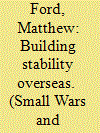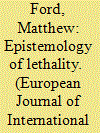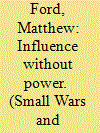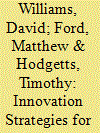|
|
|
Sort Order |
|
|
|
Items / Page
|
|
|
|
|
|
|
| Srl | Item |
| 1 |
ID:
106000


|
|
|
|
|
| Publication |
2011.
|
| Summary/Abstract |
This paper seeks to explore how a particular narrative focused on population-centric counterinsurgency shaped American strategy during the Autumn 2009 Presidential review on Afghanistan, examine the narrative's genealogy and suggest weaknesses and inconsistencies that exist within it. More precisely our ambition is to show how through a process of 'rhetorical re-description' this narrative has come to dominate contemporary American strategic discourse. We argue that in order to promote and legitimate their case, a contemporary 'COIN Lobby' of influential warrior scholars, academics and commentators utilizes select historical interpretations of counterinsurgency and limits discussion of COIN to what they consider to be failures in implementation. As a result, it has become very difficult for other ways of conceptualizing the counterinsurgency problem to emerge into the policy debate.
|
|
|
|
|
|
|
|
|
|
|
|
|
|
|
|
| 2 |
ID:
132268


|
|
|
|
|
| Publication |
2014.
|
| Summary/Abstract |
In 2011, the Department for International Development, the Foreign & Commonwealth Office, and the Ministry of Defence launched the Building Stability Overseas Strategy (BSOS). This document sought to integrate cross-government activity as it related to conflict and security so as to 'take fast, appropriate and effective action to prevent a crisis or stop it escalating and spreading'. At the heart of the strategy was the recognition that addressing instability and conflict overseas was morally right and in the UK's national interests. This confluence of foreign policy realism and ethical outlook most clearly found harmony in the acknowledgement that it was cheaper for the international community to avoid conflict than it was to try to manage it. Through an examination of three historical case studies (Uganda 1964-1972, Rhodesia-Zimbabwe 1979-1981, and Sierra Leone 2000-2007), this article seeks to demonstrate just how difficult this seemingly sensible strategic outlook is. In particular, the article shows there are historical parallels in British postcolonial history that very closely resemble contemporary policy choices; that these can be used to define what is different about past and present practice; and, which in turn, can be used to - at least tentatively - mark out the potential strengths and weaknesses in BSOS.
|
|
|
|
|
|
|
|
|
|
|
|
|
|
|
|
| 3 |
ID:
122393


|
|
|
|
|
| Publication |
2012.
|
| Summary/Abstract |
Donald Rumsfeld was right. Force transformation works. The techniques
that led to the initial victories in Afghanistan in 2001 were precisely those
that produced success in Libya in 2011.1
Small-scale deployments of special
forces backed by precision strike and deep attack capabilities used to support an
allied indigenous armed group proved an effective military tool for achieving
specific strategic outcomes. In contrast, the results of large-scale troop deployments as part of counterinsurgency (COIN), stabilization and nation-building
activities over the past 1ten0 years in Iraq and Afghanistan have been less definitive. Despite intensive investment in blood, treasure, and military effort, the
precise long-term outcomes of these two campaigns remain unclear and will
be open to debate for years to come. This challenging operational experience
has, however, highlighted some necessary and enduring truths about the use of
military force. Despite great advances in military technology and the increasing
sophistication with which organized violence can be applied in a range of situations, all warfare remains characterized by uncertainty; there exists no silver
bullet that can guarantee enduring political success from the barrel of a gun.2
|
|
|
|
|
|
|
|
|
|
|
|
|
|
|
|
| 4 |
ID:
171788


|
|
|
|
|
| Summary/Abstract |
The science of ammunition lethality is a field that seeks to define the point at which military ordnance takes life and produces death. By historicising lethality's epistemology, I reveal the intellectual fissures and scientific uncertainties that have been reified and embedded into contemporary conceptions of military power. This not only tells us something about the processes by which science is subordinated to war, but also offers a new lens from which to consider the way knowledge claims about battle are co-constructed and legitimated through military practices. As a result, this article places science back into a narrative that otherwise frames the ontology of war in terms of fighting.
|
|
|
|
|
|
|
|
|
|
|
|
|
|
|
|
| 5 |
ID:
132225


|
|
|
|
|
| Publication |
2014.
|
| Summary/Abstract |
British attitudes towards military intervention following the campaigns in Iraq and Afghanistan have undergone what appears to be considerable change. Parliament has voted against the use of Britain's armed forces in Syria and the public are unenthused by overseas engagement. Conscious of the costs and the challenges posed by the use of British military power the government has been busy revamping the way it approaches crises overseas. The result is a set of policies that apparently heralds a new direction in foreign policy. This new direction is encapsulated in the Building Stability Overseas Strategy (BSOS) and the more recent International Defence Engagement Strategy (IDES). Both BSOS and IDES set out the basis for avoiding major deployments to overseas conflict and instead refocuses effort on defence diplomacy, working with and through overseas governments and partners, early warning, pre-conflict prevention and post-conflict reconstruction. Developing a number of themes that reach from across the Cold War to more contemporary discussions of British strategy, the goal of this special edition is to take into account a number of perspectives that place BSOS and IDES in their historical and strategic context. These papers suggest that using defence diplomacy is and will remain an extremely imprecise lever that needs to be carefully managed if it is to remain a democratically accountable tool of foreign policy.
|
|
|
|
|
|
|
|
|
|
|
|
|
|
|
|
| 6 |
ID:
154960


|
|
|
|
|
| Summary/Abstract |
Over the past 20 years, the Defence Medical Services (DMS, the umbrella organisation for medical provision within the British armed forces) has been innovating consistently and at pace within the Ministry of Defence. The result of this sustained effort has led to progressive improvement in the outcomes of the critically injured. Separately, it has also led to global transformational innovation in support of the response to the Ebola epidemic in Sierra Leone. Through planned and orchestrated interventions across the entire organisation, from leadership to technology, medical practices to training and organisational design, the DMS can legitimately claim to have achieved a ‘Revolution in Military Medical Affairs’. Matthew Ford, Timothy Hodgetts and David Williams examine the innovation lifecycle within the DMS as it defines its response to the challenges of the changing character of conflict and consider the way defence medicine is an example to the wider military.
|
|
|
|
|
|
|
|
|
|
|
|
|
|
|
|
|
|
|
|
|